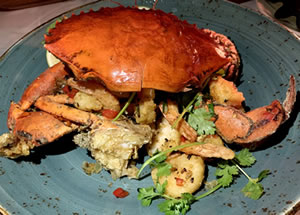
1 Kings 17:7-16 tells the story of the hospitality of the widow of Zarephath who provided for the prophet Elijah even though she barely had enough for herself and her son. This story reminds me of people whom I have known during my years in Fiji who showed remarkable hospitality and provided for a visiting guest out of the little that they had.
 I remember one of those villages in Ba whose Catholic community often had little money to put into the plate. Instead, they would catch three or four land crabs, tie them up, and put them in the back of the parish truck. On one occasion I got back to the presbytery and put the box of crabs in the kitchen. At that time, there were two of us Columban priests working in Ba. Anyway, we retired after a busy weekend and the next Monday morning, we got up to find that one of the crabs had escaped from the box and was wandering around the house. Neither Fr. Paul, who was from England, nor I knew how to catch crabs, and we were afraid of getting seriously hurt by the crab’s nippers.
I remember one of those villages in Ba whose Catholic community often had little money to put into the plate. Instead, they would catch three or four land crabs, tie them up, and put them in the back of the parish truck. On one occasion I got back to the presbytery and put the box of crabs in the kitchen. At that time, there were two of us Columban priests working in Ba. Anyway, we retired after a busy weekend and the next Monday morning, we got up to find that one of the crabs had escaped from the box and was wandering around the house. Neither Fr. Paul, who was from England, nor I knew how to catch crabs, and we were afraid of getting seriously hurt by the crab’s nippers.
We eventually cornered the crab and built a barrier around a corner section of the house to keep the crab at bay. We were grateful when Bonner, one of our workmen from a village down the Ba river, finally arrived. He had grown up catching crabs and we were amazed at how he fearlessly stepped into the makeshift enclosure where the crab was caught, picked it up with one hand and with the other gently and easily bought the claws together over the top of its head and tied it up with twine.
How often do we rely not only on the hospitality of the local people but also on their knowledge and skill? Otherwise, we would not have got much for lunch that day! Indeed, these village people are, as Matthew’s Gospel (5:13-15) calls them, “the salt of the earth.” I remember with gratitude people who taught me so much about what it means to be hospitable and to be always willing to give out of the little that one has.
Columban Fr. Tom Rouse provided this reflection.